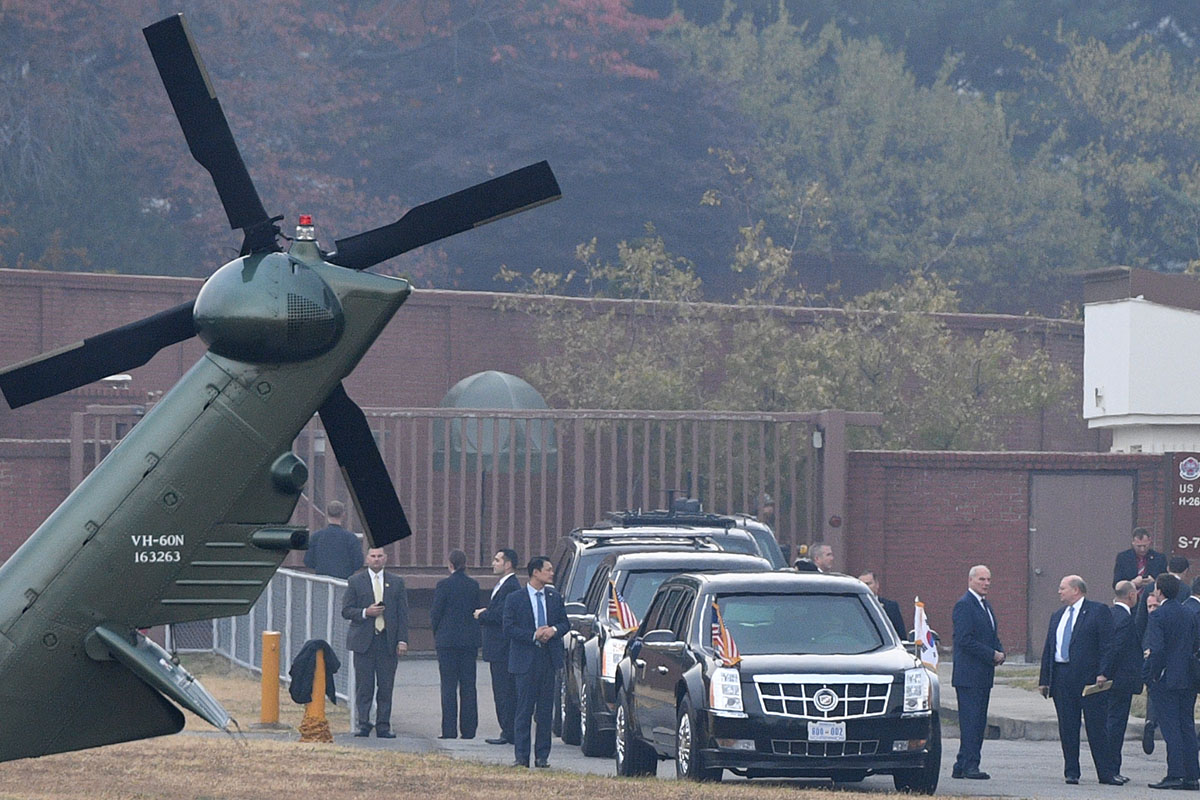US President Donald Trump was forced to abandon a surprise visit to the Demilitarized Zone that divides the two Koreas on Wednesday due to bad weather, leaving him "pretty frustrated" according to the White House.
South Korean leader Moon Jae-In, who had flown earlier before the weather closed in, was left waiting at the border which bristles with electric fences, minefields and anti-tank barriers.
The US chief executive, who the White House had previously said would not go to the symbolic spot, took off from the Yongsan military base in Seoul, but his helicopter then had to turn back due to fog.
Moon had flown to the border earlier, before the weather closed in, the South's presidential office said according to reports, and was left waiting for Trump at a guard post on the frontline.
Visiting US presidents have regularly gone to the DMZ, where soldiers from North and South Korea face off along a border marked by concrete blocks between emblematic blue huts.
Administration officials had said before Trump's Asia tour that he would not make the trip, saying it was "becoming a little bit of a cliche, frankly" after visits by Vice-President Mike Pence and Defense Secretary Jim Mattis.
But reporters accompanying Trump were summoned earlier than scheduled Wednesday and press secretary Sarah Huckabee Sanders told them: "This is where we're going," holding up a piece of notepaper on which the letters "DMZ" were scrawled.
Trump's helicopter Marine One took off from Yongsan, but was forced to turn back. The group waited nearly an hour for conditions to improve, but the weather worsened instead and the trip was abandoned.
"He's actually pretty frustrated," said Sanders.
Moon suggested the joint visit to Trump during their summit on Tuesday, the South's Yonhap news agency cited a Seoul presidential office official as saying.
Sanders said she believed it would have been a "historic moment" as the first time US and South Korean presidents had visited together.
The plan showed the strength "and importance of the alliance between the two countries," she added.
"We are going to have an exciting day tomorrow for many reasons that people will find out," Trump said at a state dinner Tuesday, without elaborating.
'Make a deal'
Trump was due to address South Korea's national assembly later before heading to China on an Asia tour that has largely been dominated by the North's nuclear programme.
Standing alongside Moon on Tuesday, he reiterated that he was prepared to use the full range of American military might to halt Pyongyang's march towards becoming a full-fledged nuclear power.
Pyongyang has launched missiles apparently capable of reaching much of the US mainland, and in September carried out by far its most powerful nuclear test to date.
But Trump's tone in Seoul, just an hour from the DMZ and a city whose 10 million inhabitants would find themselves on the front line of any conflict, was in marked contrast to his previous threats of "fire and fury".
"Ultimately, it will all work out," he said. "It always works out. It has to work out."
He left room for dialogue with the North, saying: "It makes sense for North Korea to come to the table to make a deal that is good for the people of North Korea and the people of the world."
Even so the North's Rodong Sinmun newspaper, the mouthpiece of the ruling Workers' Party, condemned his visit Wednesday as "a deliberate scheme aimed at strengthening military threats against us and to light the fuse of nuclear war".
"War maniac Trump is pushing tensions to the extreme by spewing threats of war against us," it said in an editorial.
South Korean media were relieved Wednesday that the summit with the notoriously impulsive US leader went smoothly without any surprises.
"We are extremely glad that the first day of President Trump's visit passed successfully," said the JoongAng Ilbo in an editorial.
But it pointed out: "President Trump can pressure us at anytime at anywhere with a card we'd never thought of."
In his 20-minute parliamentary address, Trump is expected to touch on key issues including North Korea's nuclear threats as well as the trade imbalances between the US and South Korea.
His administration has caused consternation in Seoul by demanding the renegotiation of the five-year-old US-Korea free trade agreement, which Trump called Tuesday "quite unsuccessful and not very good for the United States".
Some observers have fretted that a gaffe by a president given to off-the-cuff remarks during his parliamentary address could send tensions rising on the peninsula.
"If Trump says anything that can provoke North Korea, it could send military tensions soaring again," said professor Koo Kab-Woo from the University of North Korean Studies in Seoul. – AFP
Recommended stories:
